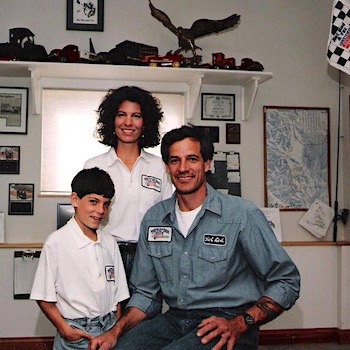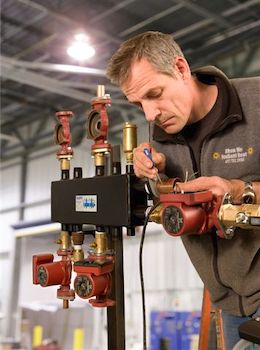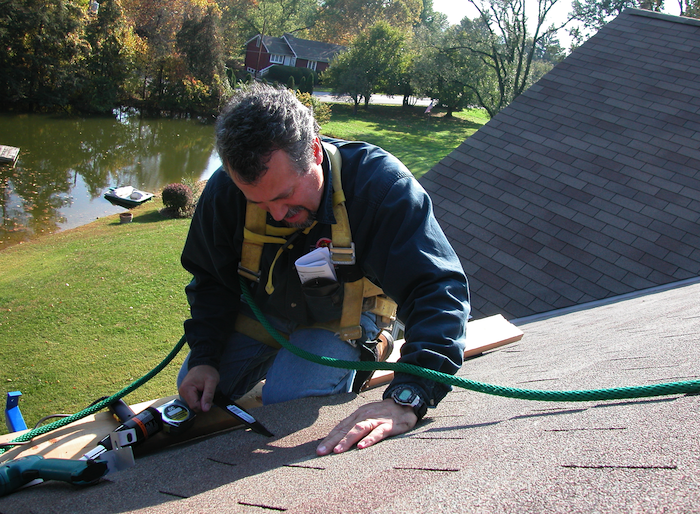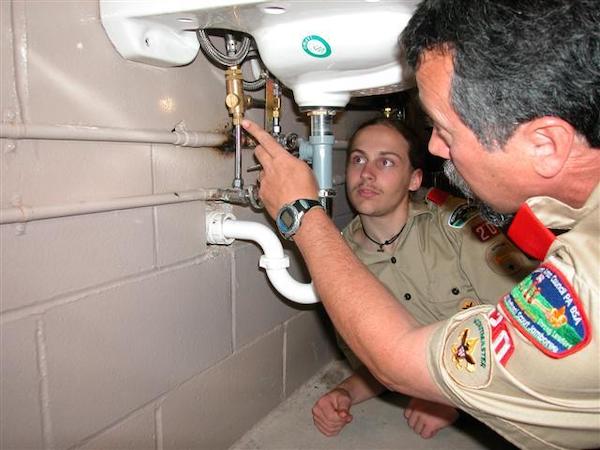Mechanical Hub recently talked candidly with three industry icons about their decision to retire from the trades.
According to an article published by The Washington Post, “there were 76 million people born between the years 1946 and 1964, the traditional window for the baby boom generation. That means that they will retire over a 19-year period. Simple math shows that 76 divided by 19 is 4 million, or almost 11,000 people a day.”
With the average age of contractors reaching into the 50s, the inevitability is that people in the trades will retire sooner rather than later. Covering the p-h-c industry for nearly 20 years, I’ve made some great friendships. Over that time, some of my friends have retired from the trades, or are thinking about it. Guys who have invested more than 35 years in an industry that they love. How did they come to this conclusion? How did it feel? Were they ready? And, what’s next?
The Reality
Recently, I talked with three gentlemen who have made the call to “hang up the wrenches” and they gave me a candid look inside the decision. “It’s quite emotional at first because, in my case, it is your life’s work, your passion, your baby, but you do gradually come around,” says Dave Yates, owner, F.W. Behler, York, Pa., who is in the transitioning phase of selling his business. “In some respects, it is hard to fathom that I’m actually retiring and will be turning over the reins to someone else. However, tough as it is to let go and wish new owners well, I’ll still be involved as needed or requested.”

The Rohrs—The Early Years. Hot Rod, his wife Ellen and his son Max—all still very active in the industry today.
For Yates, the wheels started spinning during one of those supply house incentive trips. Scott Weaver, head of APR Supply, had invited several couples to join him for breakfast on the last day. “I ended up sitting next to him. First thing he says to me and my wife Lois, ‘So, what’s your exit strategy?’ We had casually talked about that but we had never really gotten serious. In our early 60s, so we both felt like time was on our side, but that did start us planning.”
For Stephen Minnich, formerly of Minnich Mechanical Design, Elk Grove Village—which featured high-end hydronic projects—it was one of the toughest things he’s ever done. “I’ve worked with my hands and tools my entire adult life. I had a great reputation for the systems I put together. I loved my job.”
Minnich had been banged up physically for awhile—his knees, hips, and feet were shot; his back was a mess; he was 58 and already had two neck surgeries, shoulder surgery, two hand surgeries, and knee surgeries—but he absolutely loved what he did so he just kept on pushing forward. Minnich did ease up on the heavy lifting the last couple years and let his installers handle it—his focus was selling, designing systems, quality control, and all the other particulars of operating a business.
Yet after his lead installer left, and realizing that it wasn’t possible to train another boiler installer quickly, he started doing everything else himself again. “It was hard from the get-go. The jobs looked great, customers were happy, money was good, but I just couldn’t do the physical work anymore,” says Minnich.
The decision was clear that Minnich needed a change so he gave his customers a two-month notice. He ensured them that any warranties would be honored until they expired, and he even gave them referrals for other hydronic companies for the future, which, deep down, was a difficult thing to do.
“Those two months gave me enough time to be comfortable in my decision. I knew nothing could replace what I was doing but I also knew that my body wasn’t replaceable either,” says Minnich.

Stephen Minnich with his daughter in the mid-1990s.
For Bob ‘Hot Rod’ Rohr, who owned Show Me Radiant Heat, the “time” varies from person to person. Financial ability to retire comfortably, health and body wearing out, lost interest and drive, the possibility feeling out of touch and left behind by technology. Seeing the clock moving faster and faster are all contributing factors. “It was a bittersweet experience. Hanging on to some tools helps ease the thought of quitting. I doubt a true wrench puller ever actually retires. They slow down, work for friends and neighbors without pay,” says Rohr.
But actually retiring, retiring? For these three, the plan is to remain active in the industry.
“I’ll let you know when I get there. I’m not ready for that yet. There’s still too much I want to learn and put into practice,” says Minnich, who has made the transition by working for a company in Chicago that facilitates the hiring of hydronic contractors for energy efficiency upgrades of complete systems, controls, ECM pumps, etc. He also writes a monthly column for a trade publication. “I focus a lot on design, but also the mistakes I’ve made and the things I’ve learned over the course of 40 years.”
As with most contractors, Yates has been hit with the “Can’t-sit-still-itis” bug, and although he certainly won’t miss being connected 24/7/365 and answering customer calls and emails every day, even on vacation, he will still continue work via writing, consulting and video production work. “After telling Lois it would be great to win the lottery and do nothing, many years ago, she replied. ‘Great, what are you going to do the second day?’”
As the day draws nearer for Yates, he’s been developing plans with manufacturers that will keep me quite busy. “Writing for a trade publication will also keep me going to trade shows, so I’ll be able to stay current with industry and product changes,” says Yates.
Hot Rod is currently busy traveling around North America training contractors as the lead trainer and education manager for Caleffi North America. And when he’s not on the road, you probably can find him tinkering with something back home at the shop.
Planning for Retirement
With retirement comes the need for financial security. “Begin saving and investing at an early age. Get a financial advisor and develop a plan for retirement,” says Yates. Through F.W. Behler, it was one of the first contracting firms to offer a 401K program to its employees. “Cost us a ton of money to develop, but a young apprentice starting here today should easily be a millionaire by retirement age. We contribute a percentage of their gross pay into their 401K account so, even if an employee doesn’t initially participate, their account still grows,” says Yates.

Rohr working on a Grundfos SuperBrute.
When Yates turned 62, a representative from a large company stopped in his office and told him that they wanted to purchase the business. “Given that we are one of the oldest mechanical contracting firms in the country with a rich heritage and stellar reputation, it was very important we sell to someone who would treat the company with the utmost respect and carry on the name F. W. Behler with honor,” says Yates.
Yet, Yates knew all this giant wanted was his customer list and would not necessarily keep his employees, and he knew their benefits did not match the company’s benefits. “However, it seemed like a great way to learn the ropes, so we hired a lawyer and got our accountant to establish a sale value. We had meetings and went through the process, which really opened our eyes to just how complex the process would be. Ensuring a smooth transition for our employees was paramount, too,” says Yates.
Rohr suggests start planning a few years upstream and meet with a financial planner. “Explore part-time positions, maybe look outside of your current occupation to learn new and challenging things that help keep the mind active. Talk with recent retirees for advice. Keep a lot of crossword puzzles on hand.”
Giving Back
One thing is for certain, these three guys feel the need to help the younger generation fall in love with the trades. “Part of a Masters license requirement should be that you pass the knowledge forward, or backward. This could be training, online seminars, blogs, chatrooms, school talks, etc. There are so many mechanisms available these days to share what you have learned to pass that energy to a newbie,” says Rohr.

A strapping Dave Yates completes some work on a rooftop.
Rohr continues, “Glamorize the trades—keep repeating the message of good wages, flexible hours. Compare the contribution to society between a reality star or lawyer and a plumber the protects the health of the nation. The trades are the first to respond after natural disasters to get water, power, etc. back online. Take the message to the schools early, grade school projects and talks, for example.”
Yates urges to continue to preach the gospel truth that a career in the trades can provide a very comfortable living. “It must be working because trade school enrollment has spiked upward and I heard a commercial for college careers where they were poo-pooing a career in the trades. We also, as an industry, need to embrace training minorities and that includes encouraging women to enter into the trades,” says Yates.
According to Minnich, “We have to start teaching our kids that there’s honor in having the kind of skill level you’ll have in the trades; there’s no shame in getting your hands dirty.”
Spare Time?
When asked about what they would do with their spare time, all three had their dreams, but want to continue to stay busy. “Music, reading, and sports have always been a big part of my life so I get to indulge in more of that now. I’ve also caught the writing bug, so I tend to do a lot of that also. And last but certainly not least, I now have two young granddaughters and they’ve been game changers for me. They’re are so precious!” says Minnich.
For Rohr, “My plan would be to travel, hike, ski, explore the back roads of the U.S. Visit every national park.”

Donating his time, Dave Yates points out some undersink plumbing with the local Boy Scouts.
Yates plans to spend more time with his grandkids and try to go on a vacation for more than one week. Also, Yates belongs to a trout fly fishing club that was founded by his father and a group of men dedicated to conserving the sport. “I’ve only ever had time to go fishing one day each year so I’ll be on the stream more often. Oh, and play with my grandmother’s 57 Chevy 2-door 210 Belair and go for drives just for fun.”
Yet throughout it all, “Family always comes first,” says Yates. “Make time to do things with your kids, even if it means losing some work. Coach, assistant coach, be the scorekeeper, attend practices and games, or be active in other things such as scouts or community involvement.”



